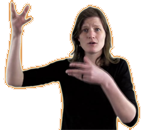Kenya is a country in Africa with a particularly high refugee population. Kakuma Refugee Camp counts over 185,000 registered residents from 13 Sub-Saharan African countries. There are organisations, such as Handicap International, that cater to the needs of people with disabilities in the camps (including deaf people), offering individual and community-based rehabilitation programmes, and basic education. Using the intersectionality lens, the project investigates
- how deaf people of different national and ethnic backgrounds produce deaf spaces across difference (both within the camp and with deaf Kenyans outside of the camp);
- how (combination of) gender, religion, ethnicity, nationality impact on bringing deaf refugees together (or preventing them from gathering); and
- what kind of inequalities exist within deaf spaces in particular, and within the camp structure as a whole.
Using the translanguaging lens, the research will focus on
- communication of deaf refugees with each other (their use of national/regional (sign) languages including Kenyan Sign Language);
- communication strategies with hearing refugees and service-providers; spaces and processes of language learning; and
- ideologies concerning Kenyan and non-Kenyan (sign) languages.
[pt_view id=”ca303890kc”]







